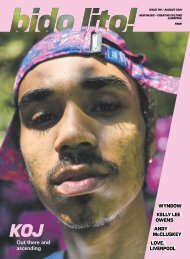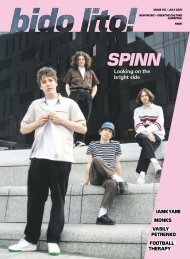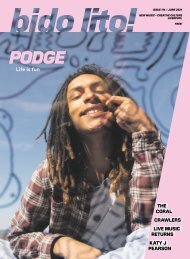Issue 113 / April-May 2021
April-May 2021 issue of Bido Lito! magazine. Featuring: PIXEY, AYSTAR, SARA WOLFF, DIALECT, AMBER JAY, JANE WEAVER, TATE COLLECTIVE, DEAD PIGEON GALLERY, DAVID ZINK YI, SAM BATLEY, FURRY HUG, FELIX MUFTI-WRIGHT, STEALING SHEEP and much more.
April-May 2021 issue of Bido Lito! magazine. Featuring: PIXEY, AYSTAR, SARA WOLFF, DIALECT, AMBER JAY, JANE WEAVER, TATE COLLECTIVE, DEAD PIGEON GALLERY, DAVID ZINK YI, SAM BATLEY, FURRY HUG, FELIX MUFTI-WRIGHT, STEALING SHEEP and much more.
You also want an ePaper? Increase the reach of your titles
YUMPU automatically turns print PDFs into web optimized ePapers that Google loves.
walk.” But the dual meaning of the track also follows her on<br />
her journey along the train line when visiting her parents. The<br />
coupling of these two tales left Pixey fearing that her love<br />
letter could come across as “cheesy” and not the “lo-fi 90s<br />
jingle” she was aiming for. In truth, it is actually a fitting label<br />
for the track. Taking me back to first moving to Liverpool and<br />
discovering the powerful, grounding power of the docks, the<br />
track is undeniably a standout of the EP.<br />
The singles she released in 2020 offered a taster of what<br />
was to come on her brand new EP, Free To Live In Colour.<br />
Just Move, the lovechild of The Prodigy, Nile Rodgers and<br />
60s garage definitely scratched the itch while we waited<br />
to see where her music was heading. “I wanted it to be<br />
huge. But now I’m thinking, how am I going to recreate that<br />
live?” Pixey ponders. It’s a new sound for her, but with more<br />
confidence in her ability, the shoe fits. Although she does<br />
admit to needing “some sort of live budget” to get all the<br />
elements of the track covered.<br />
Her formative track, Young has been overshadowed by<br />
that which has followed. And while she refuses to completely<br />
abandon utilising samples and programming her drums, it is<br />
clear that Pixey has found a more personable sound through<br />
her mastery of an ever-growing skill set. It is the armour<br />
that she speaks of on Free To Live In Colour, her ability to be<br />
self-sufficient. “I know it’s not a phase,” she clarifies, adding<br />
weight to the authenticity she has found since following her<br />
ambitions and goals within the music industry.<br />
And yet, with all of the internal work she has done to<br />
develop her trust in herself, she still faces the internalised bias<br />
of those who do not believe that her work is all her own doing.<br />
She is constantly interrogated about who produces her music<br />
and who writes her lyrics. She herself acknowledges that<br />
these questions are “not meant in a patronising way”, instead<br />
they are a manifestation of the sexism that goes unchallenged<br />
within society, of believing women aren’t capable of being<br />
multi-faceted.<br />
In a male-dominated industry, where according to the<br />
USC Annenberg Inclusion Initiative only 2.6 per cent of<br />
music producers and three per cent engineers/mixers in the<br />
industry are women, it’s unsurprising that Pixey is one of<br />
the victims of such narrow-minded thinking. But she is not a<br />
one dimensional being and it’s clear as she sits in her room,<br />
pointing out instrument after instrument around her, that<br />
she could never be restricted by these limitations. Instead,<br />
she is simply Pixey, an ever-evolving creation. She recites<br />
her favourite quote – “don’t assume, it makes an ass out of<br />
u and me” – and I have to laugh. It perfectly sums up how<br />
meaningless these judgements are.<br />
Following the success of Young, she explains that she was<br />
left with the exhausting task of proving she was “consistent<br />
and can constantly reinvent and create”.<br />
“It felt like I was running an uphill battle,” she elaborates,<br />
“to prove that I could do something after that.” Now, thankfully,<br />
this weight seems to have eased. “I can put a middle finger up<br />
to those people who made me feel like I was only a one-trick<br />
pony,” she states. “I want to do this for a long time.”<br />
It is this refusal to be limited and a constant determination<br />
to succeed that has allowed Pixey’s sound to evolve.<br />
Blending baggy 90s sounds with the ever-renewing list of<br />
instrumentation, her style is a personification of graft and<br />
autonomy, of drive and creative control.<br />
“It’s so liberating,” she explains of her self-sufficient<br />
reality, “to be able to play the main, core instruments on your<br />
own songs and also have the choice to programme them<br />
too if you want.” With this drive to rely on no one has come<br />
the challenge of being comfortable with others wishing to<br />
collaborate and critique, to learn from those around her in<br />
order to better her craft.<br />
She admits being able to loosen her grip on the “personal<br />
thing” she creates is a “struggle”, with it taking time to accept<br />
that she wasn’t undermining herself by reaching out to ask<br />
for help. Instead, it has allowed her to grow as a producer,<br />
refining her skills and ear for what she wants in her tracks.<br />
Her bedroom production roots are yet to loosen their grip<br />
on her overall product. The events of the last year have done<br />
little to usher her out. “Now a lot of people produce in their<br />
bedrooms, which is fantastic,” Pixey observes, “a lot of women<br />
as well, which is really cool.” This is something that visibly<br />
brings joy to her. “<strong>May</strong>be people are more vocal about it now,”<br />
she says, “but it’s really cool, it made me feel much better<br />
about the way I was working.” With her previous illness and<br />
anxiety-driven decision to set up in her bedroom becoming<br />
a necessity for others, it’s clear to see how she went from<br />
feeling like an individual to being surrounded by a community<br />
of fellow bedroom producers.<br />
In what has been a difficult 12 months for so many in the<br />
industry, Pixey is humble in noting how it’s been a good year<br />
for the rising star. “I feel privileged to be able to say that,”<br />
she elaborates, crediting her new-found momentum for this<br />
unexpected positivity amid a worldwide pandemic. And it was<br />
a singular decision to ignore those who told her she “wasn’t<br />
going to go anywhere and was wasting [her] time” that led to<br />
her taking up her music career once more and send demos off<br />
to Chess Club Records.<br />
Boasting the likes of Alfie Templeman and responsible<br />
for early releases by Wolf Alice, Chess Club are a force<br />
to be reckoned with, and 2020 saw Pixey added to that<br />
ever-impressive roster. A singular “vulnerable moment” of<br />
sending off those unheard pieces led to one of the biggest<br />
opportunities in her career so far. “It felt like a dream come<br />
true,” she says, recalling sitting down with Will and Peter of<br />
the label and signing on the dotted line.<br />
The rose-tinted glasses of that experience feel slightly<br />
tainted, she admits, by the music industry’s decline at the<br />
hands of the Conservative government. Joy quickly turns to<br />
anger when we progress into the future our community faces.<br />
“The amount of idiocy,” she screams, “I’ve not given nearly<br />
fucking seven years of my life to retrain.” And just like that,<br />
I see what music truly means to her. While the rest of the<br />
conversation showed love for her craft, it was in this moment<br />
that it clicked. The girl in the pixelated image on my screen<br />
is not comfortable simply succeeding as an individual, but<br />
fights for those around her, too. Having shed the skin of the<br />
nervous newcomer we once met, this is someone who owes<br />
everything to music, who fully grasps the power it holds. And<br />
as her anger rises, the jigsaw pieces itself together and the<br />
image of who Pixey truly is feels complete.<br />
Said image is repeated<br />
in the single Free To Live<br />
In Colour, written prior to<br />
her recent signing. She<br />
explains it as a “fever<br />
dream of confusion”,<br />
combined with “telling<br />
“I’m not just a<br />
newbie anymore”<br />
everyone to fuck off”<br />
because the system, well,<br />
sucks. The song mirrors<br />
Pixey’s own fight for<br />
freedom to live as she<br />
sees fit. It channels former<br />
and current battles, like<br />
keeping “a job as well as<br />
writing and having no<br />
money”, being a “conformative non-conformative person”<br />
and being “free to live however and love whoever you want,<br />
regardless of boundaries”. All of this emotion, combined with<br />
a boundary pushing production, left Pixey impatient to release<br />
the track after having sat on it for so long.<br />
This impatience is mirrored in how she perceives the<br />
world at the moment. Angry at the way creatives have been<br />
undervalued and dismissed by the powers that be. “It’s not<br />
just a piece of entertainment, people make their living off of<br />
this and, for some, it’s a form of therapy,” she expresses. She<br />
speaks from experience. Music was her way out of a dark time.<br />
Her crutch. And following statements from Rishi Sunak about<br />
creatives needing to “adapt and adjust to the new reality,” her<br />
anger is more than justified. And as she laughs, recalling her<br />
short-lived and poorly executed time as a waitress, it’s clear<br />
that retraining just isn’t on the cards for Pixey.<br />
But as venues all around us are being forced to close,<br />
relocate and rethink their business plans, this fear for the<br />
creative community is unavoidable. For Pixey, the way the<br />
pandemic is “just chipping away at all the important little<br />
venues” is taken personally. That was where she started. And<br />
without places like “Zanzibar and Sound”, she wouldn’t have<br />
had the chance to be the nervous, sample happy newbie.<br />
<strong>May</strong>be she would never have had the opportunity to annoy<br />
her neighbours while learning the drums, too. But as she says:<br />
“If your music is worth it, it will have its time.” Her time is now. !<br />
Words: Megan Walder / @M_l_Wald<br />
Photography: Marieke Macklon / @mariekemacklon<br />
Free To Live In Colour is available now via Chess Club<br />
Records.<br />
@iampixey<br />
FEATURE<br />
17

















